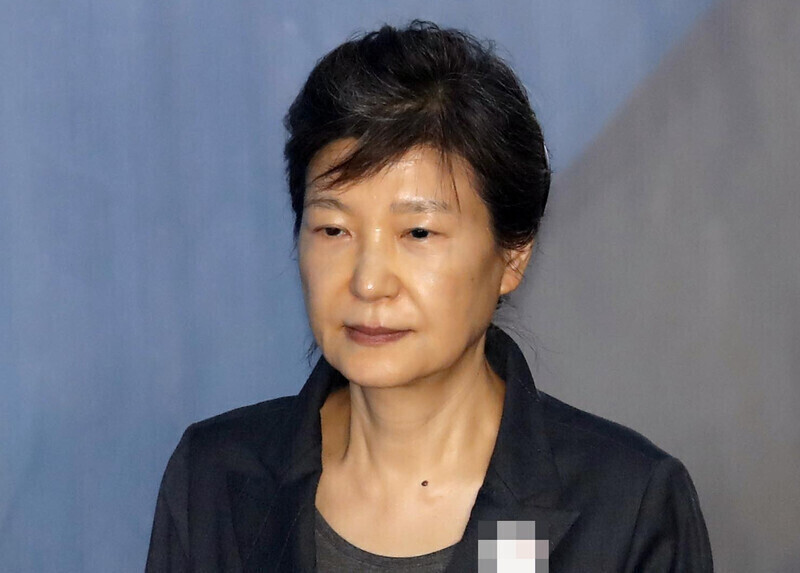hankyoreh
Links to other country sites 다른 나라 사이트 링크
Just where will Park Geun-hye land after her release from prison?

Former South Korean President Park Geun-hye will be released from her 22-year sentence for corruption and influence-peddling as of midnight Thursday. Where she will return to is a source of interest, as she is officially no longer a homeowner: Park sold her residence in the Samseong neighborhood of Seoul’s Gangnam District and bought a house in nearby Naegok neighborhood in 2017, which was seized and sold off by public auction when Park failed to pay her financial penalties in time following the final ruling for her case.
Park was admitted to Samsung Medical Center in Seoul’s Gangnam District on Nov. 22 and has been receiving treatment there since. Included among the beneficiaries of President Moon Jae-in’s special pardons for the new year announced Friday, she will be released from her sentence at the stroke of midnight on Thursday. Correctional officers from the Ministry of Justice who oversaw her sentence at the hospital will return to their posts to finalize her pardon.
Park will remain in the hospital for the foreseeable future in order to continue treatment for her shoulder and back and receive dental and mental health care. Her lawyer, Yoo Young-ha, said in a phone call with the Hankyoreh on Sunday, “Park will stay in the hospital until at least Feb. 2 of next year to continue treatment per doctors’ orders. Her hospital stay may be extended depending on how she responds to treatment.”
Where Park will reside after being discharged from the hospital is still undecided. Prosecutors previously seized her house in the Naegok neighborhood of Seoul’s Seocho District in February, selling it off in a public auction when she failed to pay her financial penalties for her crimes.
In its final ruling in January, the Supreme Court upheld a 20-year prison sentence, an 18 billion won (US$15 million) fine, and an additional forfeiture of 3.5 billion won (US$2.9 million) for Park on charges of influence-peddling and receipt of bribery in the form of “special activity funds” from the National Intelligence Service.
Previously, in November of 2018, she was also sentenced to two years in prison for meddling in the candidate nomination process of the Saenuri Party, the forerunner of the current opposition People Power Party. While her 3.5 billion won forfeiture has been paid in full through forced collection, Park has only paid 3 billion out of her 18 billion won fine. She will be exempted from her yet unpaid fine of 15 billion won following the recently announced special pardon.
Park’s Naegok residence was auctioned off to the entertainment management company IOK Company in September at 3.9 billion won. Park had previously sold her residence in the Samseong neighborhood in March 2017.
Her lawyer said that her team is looking for a residence for Park, but that nothing has been decided yet as they remain focused on her treatment.
Park released a statement following the announcement of the special amnesty on Friday, saying, “I will focus on receiving treatment for my illnesses so that I can personally thank the Korean people as soon as possible.”
Meanwhile, speculations that Park’s younger brother Park Ji-man, who serves as the president of EG Corp., will take charge of looking for a residence for his sister have surfaced, although Park’s side has said this is not likely.
Although Park will walk free following the special pardon, she will not be granted privileges afforded to former presidents per relevant regulations save those concerning security. Based on the Honorable Treatment of Ex-Presidents Act, a president who is impeached during their term is stripped of privileges such as the provision of a pension, memorial activities, a secretary and personal driver, medical treatment coverage, transportation and communication services, and a personal office, though the act does allow for security privileges.
By Son Hyun-soo, staff reporter

Editorial・opinion
![[Column] Season 2 of special prosecutor probe may be coming to Korea soon [Column] Season 2 of special prosecutor probe may be coming to Korea soon](https://flexible.img.hani.co.kr/flexible/normal/500/300/imgdb/original/2024/0426/3317141030699447.jpg) [Column] Season 2 of special prosecutor probe may be coming to Korea soon
[Column] Season 2 of special prosecutor probe may be coming to Korea soon![[Column] Park Geun-hye déjà vu in Yoon Suk-yeol [Column] Park Geun-hye déjà vu in Yoon Suk-yeol](https://flexible.img.hani.co.kr/flexible/normal/500/300/imgdb/original/2024/0424/651713945113788.jpg) [Column] Park Geun-hye déjà vu in Yoon Suk-yeol
[Column] Park Geun-hye déjà vu in Yoon Suk-yeol- [Editorial] New weight of N. Korea’s nuclear threats makes dialogue all the more urgent
- [Guest essay] The real reason Korea’s new right wants to dub Rhee a founding father
- [Column] ‘Choson’: Is it time we start referring to N. Korea in its own terms?
- [Editorial] Japan’s rewriting of history with Korea has gone too far
- [Column] The president’s questionable capacity for dialogue
- [Column] Are chaebol firms just pizza pies for families to divvy up as they please?
- [Column] Has Korea, too, crossed the Rubicon on China?
- [Correspondent’s column] In Japan’s alliance with US, echoes of its past alliances with UK
Most viewed articles
- 1‘We must say no’: Seoul defense chief on Korean, USFK involvement in hypothetical Taiwan crisis
- 2Why Kim Jong-un is scrapping the term ‘Day of the Sun’ and toning down fanfare for predecessors
- 3Two factors that’ll decide if Korea’s economy keeps on its upward trend
- 4BTS says it wants to continue to “speak out against anti-Asian hate”
- 5After election rout, Yoon’s left with 3 choices for dealing with the opposition
- 6Gangnam murderer says he killed “because women have always ignored me”
- 7South Korea officially an aged society just 17 years after becoming aging society
- 8AI is catching up with humans at a ‘shocking’ rate
- 9Ethnic Koreans in Japan's Utoro village wait for Seoul's help
- 1046% of cases of violence against women in Korea perpetrated by intimate partner, study finds